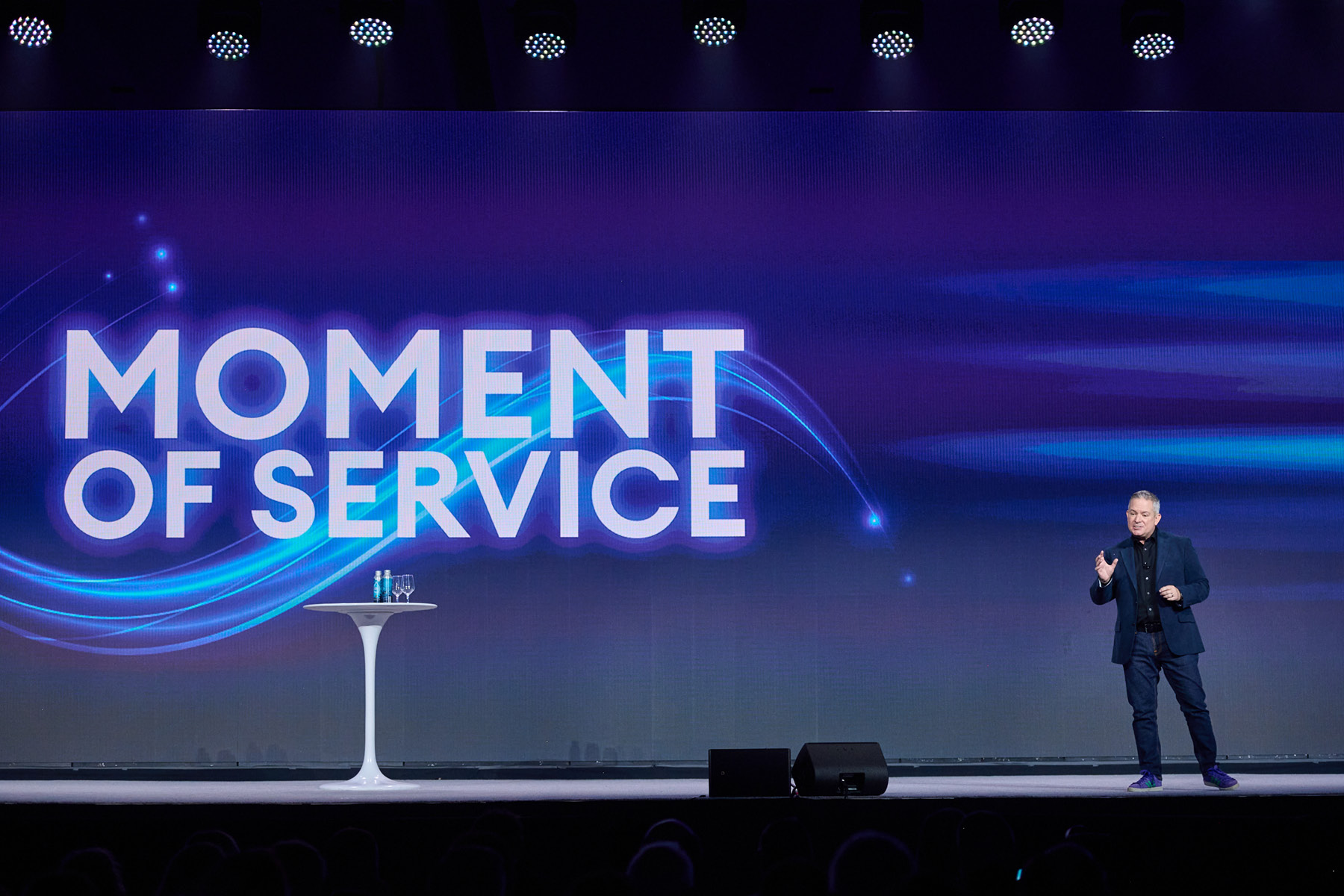Moments of Service: Darren Roos
Daren Roos launched the concept of the ‘Moment of Service’ after becoming CEO of enterprise software leader IFS in 2018. This concept enables companies to orchestrate their assets, people and customers to create amazing moments of service.
When Darren Roos became CEO of enterprise software maker IFS in April 2018, he started a process of rebranding.

During this process, he developed and launched the concept of the ‘Moment of Service’. It’s become the ethos for the Swedish-born software manufacturer, which is headquartered in the United Kingdom, as it strives to satisfy customers while differentiating itself from larger competitors.
"The idea was that for any business today, irrespective of the industry – whether it is a commercial enterprise, a civil organization or a governmental organization – they all have a moment of service or multiple moments of service," Roos tells The CEO Magazine.
"What we do at IFS is enable companies to orchestrate their assets, their people and their customers to create amazing moments of service. We are focused on industries where organizations are striving to create those moments of service, striving to create a brand that is something people can identify with."

What we do at IFS is enable companies to orchestrate their assets, their people and their customers to create amazing moments of service.
Founded in Linköping, Sweden in 1983, IFS has established itself as a leader in developing and delivering cloud enterprise software for firms focused on manufacturing and distribution, building, maintaining assets and managing service-focused operations. It specializes in horizontal software, which can be applied across specific industries.
"We focus on assets and service-centric industries so that the application is more fit for purpose out of the box," Roos explains. "This means we have an application that we can deploy faster and, as a result of that, have a faster time to value and a lower total cost of ownership.
"It’s really about that niche and being able to be confident that there is a specific area that we can focus the business on that will differentiate us."
Living the values
A veteran of the technology sector for over 20 years, Roos arrived at IFS after a successful stint as President of SAP’s global ERP Cloud business, as well as previous executive roles with the company.
He inherited a difficult situation at IFS, which he described as "dysfunctional" and "very fragmented". The company had eight regions that all operated like independent resellers.
"Everything was very decentralized," he recalls – something suboptimal for a company dealing with global customers and global partners.
You want to make sure that your people come on the journey with you, that they’re engaged and that they’ve bought into the vision.
Roos instilled a mantra of continuous improvement in the company’s 5,500 employees, though it was no easy task as the IFS scored low on the HR maturity index.
"The question is, how do you mature that without going too fast?" he says. "Because you want to make sure that your people come on the journey with you, that they’re engaged and that they’ve bought into the vision, that they understand where you’re going.
"The key has been driving continuous improvement but being very focused across the entire business on where we can get the biggest bang for our buck. I think the important thing is that, as a business, we are very focused on our customers."
Roos also instilled a culture in the company, based on its already established values of agility, collaboration and trust.
As he explains, a corporate culture is a product of values, and instilling it across geographies isn’t easy and is bound to fail if there’s any attempt to try to standardize the culture.
"But if you live those values and you demonstrate those values, then that leads to a kind of similarity in all of the geographies because it’s difficult to form a culture that is detached from those values."
In addition to instilling a culture and outlining the company’s core values, Roos started building trust with employees early on.
"It began with being authentic and not just telling people what you think they want to hear," he reveals.
That trust was deepened during the COVID-19 pandemic when IFS implemented a four-day work week, with 80 percent pay for employees. The company achieved a 100 percent participation rate with 80 percent of the workforce doing so voluntarily.
"In my tenure at IFS, I have not laid off anyone," he says with pride. "And that doesn’t mean we wouldn’t, but we’ve been proactive and have collaborated with the employees to go, ‘What are the objectives that we have as a business? How are we going to get there?’ That builds trust."
Building brand recognition
Perhaps the biggest challenge Roos faced upon becoming CEO was branding.
"Earlier, IFS was very much an enterprise resource planning (ERP) company. But we faced a significant branding challenge, which is that by the time I’d been there for a couple of years, we were no longer an ERP company," he explains.
"We had over 50 percent of our business coming from field service management and enterprise asset management. And we needed to figure out how we were going to almost decouple ourselves from what brand we had."
That’s what we’ve been focused on, working out how we can really drive recognition around the new branding.
Part of the branding exercise was building brand recognition.
"No-one wants to be a vendor where you’re engaged on a large critical project and it goes up to the board for approval and the board goes, ‘I’ve never heard of IFS’," he explains.
"How do we make sure that the key decision-makers and influencers recognize the brand? Fortunately with the world of digital, it means that we can be super targeted on that now.
"So that’s what we’ve been focused on, working out how we can really drive recognition around the new branding, with the new logo, with this moment of service understanding."
Ecosystem of partners
Another challenge for Roos was revamping the relationship between IFS and its partners. The company previously focused on being the sole provider of IFS consulting in the market and saw it as a differentiator at the time, he explains.
However, some clients wanted optionality in consulting – though many did prefer IFS – which prompted Roos to build up an ecosystem of 500 partners that can be deployed.
"Clients now know that we are a one-stop shop solution provider for them around assets and service, and they’ve not had that before," he says.
"I think that making ourselves easier to deal with, and not competing with the partners ever, are the ingredients that have made building this ecosystem so successful."
As he looks over the medium-term, toward the end of the decade, Roos has IFS focused on continuing its ‘Moment of Service’ concept, along with deploying faster, creating a faster time to value and a lower cost of ownership.
"Our focus is very much on continuing to do those things," he adds. "How do we continue to enhance the technology and our proposition, everything that goes around the technology, our deployment capability, our partner ecosystem, the work that we do before we sell, how do we get all of that focus so that we can enhance those three attributes?"
As we engage with customers, it’s about getting very focused on where that value creation is.
The process for reaching its objectives starts with creating easy-to-deploy software with good functional coverage, he says. "And then as we engage with customers, it’s about getting very focused on where that value creation is," he confirms.
IFS uses a program called the Business Value Assessment to determine customers’ pain points and then creates a plan with them to specifically address those pain points.
"The struggle for us is how do we make sure that we get our technology into the evaluations as these companies come to market to do those transformations?"
Customers have expressed satisfaction with the ease of flexibility of IFS products, along with its top-notch service, as have partners including Boomi, a leading company for intelligent connectivity and automation. Surveys in the industry confirm this.
"If you go to Gartner Peer Insights, where customers rank their vendors, we are the number one customer ranked vendor," Roos points out.
"If you think about it from a customer satisfaction perspective, we’re the highest ranked across field service management software, ERP software and enterprise asset management software."
That validation, he adds, "creates pull".
Sponsored by: Arcwide
Uniting technology innovation and professional services to help companies accelerate value realization.
Read More